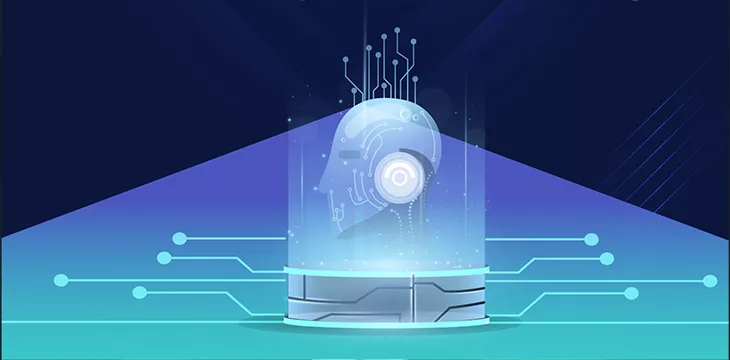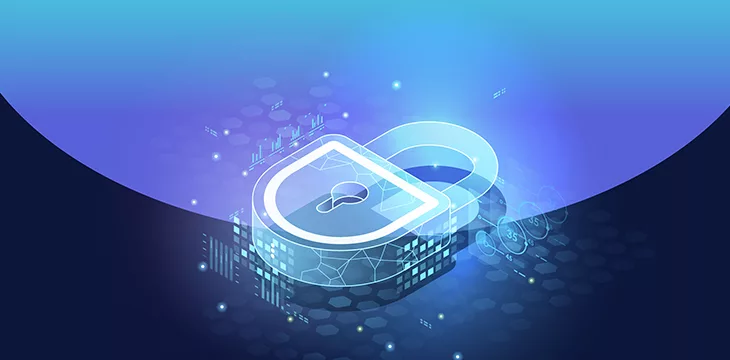Blockchain uses new systems and processes like smart contracts to improve transactions. Smart contracts allow parties to transact without manual triggers.
These contracts are tamper-proof since no one can change blockchains without notifying others in the network. Plus, there’s no need for a middleman because smart contracts can execute independently. As such, smart contracts are ideal for secure negotiations and transactions.
Meanwhile, the advent of artificial intelligence (AI) has many blockchain enthusiasts eager to see how smart contracts will evolve. Combining the two technological innovations can further improve the efficiency of the blockchain process and enhance the use of decentralized networks.
It’s best to be on the lookout for upcoming changes in this space. Refer to the infographic below to know how AI smart contracts work and why you should prepare for this next wave of technology.

Smart Contracts and AI Automation: By the Numbers
The most recent statistics give you a full scope of the state of AI and smart contracts in business.
1. Blockchain smart contracts will improve data quality by 50% (Gartner)
Smart contracts enhance and accelerate analytical decision-making by guaranteeing expected outcomes when parties meet the contract’s conditions.
Since a business’s value relies on the quality of data it acquires and manages, smart contracts ensure that the majority of the information used is reliable and accurate before execution.
2. The global AI market size may grow to $1.3 trillion by 2030 (MarketsandMarkets)
AI isn’t just another technological trend. Businesses and governments worldwide are investing considerable resources to adopt it into their processes while finding creative ways to leverage its power.
3. Global smart contracts may become a $1.46-billion market by 2029 (Valuates Reports)
Business processes evolve as technology advances, much like how video conferencing became the norm once computers, cameras, and internet connectivity improved. Experts expect a similar outcome to AI smart contracts in the business world. That means you can expect AI smart contracts in at least one of your next business agreements.
4. 35% of companies currently use AI for their business (Hostinger)
More companies realize how AI can enhance the workforce’s productivity and output. It’s why almost one in three businesses have artificial intelligence as part of their work processes.
According to Hostinger, the industries with the highest adoption rates include financial services, retail, healthcare, and manufacturing. They use AI to improve workflows and even create products and services, highlighting the technology’s versatility.
5. Businesses can accelerate 20% work with the current generation of AI (Bain & Company)
AI is sure to grow. According to Bain & Company, the current generation of AI tools can speed up a portion of a business’s processes without dipping in quality.
In other words, the current artificial intelligence models can fulfill responsibilities like humans do. This touches on the benefit of self-executing smart contracts, which no longer require a third party to ensure the conditions are met and funds are distributed appropriately.
The Intersection of AI and Smart Contract Automation
Combining AI and smart contracts creates new possibilities for how blockchain technology works and how businesses worldwide can leverage their power.
Disruptive technologies
There’s no question that the emergence of blockchain and AI will bring about considerable changes across industries. With the merged strengths of AI and smart contracts, there’s little to no room for human error while speeding up the trigger and execution of codes.
Need for computational power
Discussing AI in the current technological climate naturally raises questions regarding machine learning and large language models. Studies show that AI is the next generation of computing, emphasizing the need for better computational power.
AI analyzes volumes of data in seconds to arrive at a well-informed decision. This functionality is valuable when determining whether to continue with a smart contract or hold back.
Mutual dependence on data
Blockchain and AI use data uniquely. In general, smart contracts need data to verify compliance with agreed-upon conditions. Meanwhile, AI can identify trends and patterns in massive data sets to help you make an informed decision before signing.
Decentralized solutions
Decentralization means there is no single entity controlling a system. It allows you to enter into smart contracts with another person or institution without needing an intermediary, such as a bank, to ensure both of you follow through on your obligations or to secure the prompt transfer of funds. There are decentralized AI systems that manage that for you.
Automatic drafting and execution
Smart contracts are traditionally coded by someone manually. However, AI allows parties to draft these contracts faster and follow specific requirements. AI also executes the contract terms once it detects the acceptance of conditions.
Negotiate and enforce terms
Because of AI’s predictive capabilities, it helps determine the terms of the contract that are most appropriate for you and your partner.
Suppose you’re entering into a smart contract with a real estate party about renting a property. AI can help you adjust the smart contract for more favorable terms in a bear market, such as negotiating a lower rent to protect your interest.
Recommend recalls
When a party isn’t likely to meet the conditions of the smart contract, AI can recommend recalls to smoothen the process. This ability helps you avoid wasting time and resources on agreements that fall through because of factors outside your control.
10 Benefits of AI Automation and Smart Contracts Combination
Smart contracts are powerful business mechanisms that ensure parties fulfill their obligations. The introduction of AI automation can dramatically enhance what smart contracts provide businesses in many ways.
1. Improved data management
Businesses manage tons of data that manual processes might not sift through. By contrast, AI can process volumes of data to arrive at well-informed decisions involving smart contracts.
2. Development tools and templates
Smart contracts are complex programs that can include numerous conditions and stipulations. Traditionally, humans needed to code it. However, mistakes are common, such as recording the wrong financial information for the contract or causing a bug in the program.
AI automation allows parties to generate and manage smart contracts without worrying about human error.
3. Interoperability standards
Interoperability refers to how a distributed ledger, such as a blockchain, receives or swaps data with other external systems. It allows data transfer from one blockchain to another for a faster launch of smart contracts.
However, the process isn’t without its hiccups. That’s where AI comes in; it helps smart contracts across blockchains or cross-chains reconcile inconsistencies or incompatibilities it may encounter.
4. Privacy-enhancing technologies
One of the basics of blockchain is that it’s highly secure. Users on the network are anonymized, so there’s very little chance for personal information to leak from the blockchain. This feature is excellent for AI-powered smart contracts that involve sensitive data, such as one’s finances or health records.
5. Ethical AI frameworks
The global effort for creating ethical guardrails for AI, such as UNESCO’s artificial intelligence recommendations, ensures that AI smart contracts don’t infringe on rights. The role of AI is to draft and execute smart contracts based on human values.
6. Regulatory monitoring compliance mechanisms
AI can track whether parties comply with the terms of smart contracts. For instance, if AI detects an insurance policyholder breaches the agreed terms, it can quickly end the contract.
7. Optimized supply chain management
Supply chain logistics are real-life problems blockchains can solve. They can provide a universal system that serves as the single source of tracking for businesses and partners when monitoring a product’s journey.
Suppose a fleet arrives beyond the agreed delivery time stipulated in the AI smart contract. AI can automatically render the contract void or issue a penalty—without an intermediary overseeing the entire process.
8. Superior fraud detection
Blockchains have incredible security. They can send information to network participants about each block changed, added, or removed, ensuring no malicious entity can tamper with it unnoticed. With the implementation of AI, detecting abnormal behavior on the network can help prevent fraud.
9. Data analytics and insights
AI can help you enter into agreements with a better grasp of what’s in the contract. This is especially beneficial if you work in the insurance industry. AI smart contracts use past customer data to perform predictive analysis and determine the appropriate insurance amount. In this scenario, AI can protect you from entering into an agreement you might be uncertain about.
10. Look for protocol-level attacks
AI could be programmed to specifically detect attacks at the protocol level on the network, such as someone trying to push privately mined and malicious blocks onto the chain. AI could quickly identify the valid chain tip and assist in honest reorganization of the blockchain itself.
4 Challenges of AI Automation and Smart Contracts
As beneficial as AI smart contracts are, there are still hurdles for users that may hamper the experience.
1. Complexity in development and implementation
AI and blockchains are still emergent technologies that require a certain level of expertise. Since these two technologies have different networks and processes, potential compatibility issues might hinder their widespread adoption.
2. Lack of standardization
There are numerous blockchain networks available worldwide. Without a standardized platform, smart contracts can encounter incompatibility errors and affect the program’s effectiveness.
3. Data privacy and security
Given that AI is suitable for data analysis, it naturally brings privacy and security concerns into the discussion. AI can sift through confidential and highly personal data if it acts without regulations or if the programming is wrong.
4. Ethical and legal considerations
AI technology is growing faster than government regulation, which has tech giants and political leaders worried about how to use it. It’s why they convened at the first AI Insight Forum in September 2023 to discuss possible regulations surrounding proper AI use. The possible laws could impact how today’s AI smart contracts may operate moving forward.
Smarter Contracts with AI Automation
Nowadays, artificial intelligence makes more tasks accessible to general users, whether it’s drafting content or creating captivating images. Blockchain, though still a highly technical and complex technology, may become the next beneficiary of AI’s abilities.
It’s no surprise why businesses worldwide invest so much in AI. The technology provides insights that help you establish appropriate smart contract terms depending on the other party’s data. It makes entering smart contracts with confidence much more straightforward.
The future of blockchain and AI is exciting. To learn more, visit CoinGeek’s resources about blockchain for beginners discussing the technology fundamentals. CoinGeek is the perfect place to get you up to speed on the tech. Read more on our blog today!

 03-01-2026
03-01-2026 


